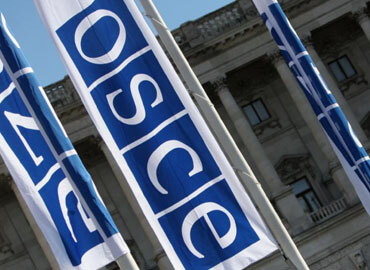The report “On Alleged Human Rights Violations Related to the Presidential Elections of 9 August 2020 in Belarus”, prepared in October 2020 by the rapporteur appointed by 17 states under the OSCE Moscow Mechanism, provides a thoroughly documented account of direct and brazen violations by the government of Belarus of its OSCE commitments and international obligations. As stated by the rapporteur, “the findings are very clear.” They convincingly demonstrate that the presidential elections were not transparent, free or fair, and that violations of fundamental human rights have been massive and systematic.
Although the people of Belarus have not had free and fair elections throughout the 26 years of Alexander Lukashenko’s despotic rule and have endured major violations of human rights during all these years, the level of the current repression is unprecedented. The ongoing crackdown is the most severe, large-scale and continuous. Dozens of thousands of people have been subjected to cruel abuse, including massive torture, enforced disappearances and killings, arbitrary detention, politically motivated criminal persecution, lack of access to justice and fair trial, forced expulsions from the country, job and university dismissals, and harassment of journalists, lawyers, trade union activists and human rights defenders. All fundamental rights and freedoms have been systematically suppressed. Use of brutal force and intimidation are the government’s only response to the peaceful protest against electoral fraud and usurpation of power and its retaliation for the legitimate exercise by Belarusian people of their fundamental freedoms. It is particularly worrying, stresses the report, that “the well-documented cases of torture and ill-treatment in the crackdown by the security forces on political dissent have not … resulted in anybody being held accountable, which confirms allegations of general impunity.”
With the release of the OSCE report on the situation in Belarus, we have now the most comprehensive and detailed documentation of the current full-blown human rights crisis in Belarus, analysed within the framework of OSCE human dimension commitments and UN human rights norms.
“What is next?” is the key question that the Belarusian people and the international community face now.
From the past experience of the application of the Moscow Mechanism we know that the value of this important OSCE instrument depends on an effective follow-up to a report. The 1991 Moscow document which established the mechanism only mentions “any possible follow-up action” but does not describe what form such actions may take and does not specify procedures. Essentially, it is the responsibility of participating States, OSCE executive bodies and institutions and larger international community to make the best use of conclusions and recommendations in the Moscow Mechanism report and undertake follow-up actions to make sure that problems identified in the report are effectively addressed and the non-compliance with OSCE commitments is rectified.
Learning from the lessons of the application of the Moscow Mechanism, we see that the release of the OSCE reports led in the past to such actions as monitoring of trials by ODIHR, prison visits by diplomats, country visits by high-level OSCE representatives, appointment of ad hoc OSCE envoys, establishment of working groups and special representatives in the OSCE Parliamentary Assembly, placing the situation on the agenda of the UN Human Rights Council and the UN General Assembly with production of reports and adoption of resolutions, establishing a mandate of the UN country rapporteur, using conclusions and recommendations of the OSCE report for adopting conditions and benchmarks in taking decisions on trade and economic relations with the state in question, including application of restrictive measures, as well as in strategies of international financial institutions. These and similar types of follow-up actions are aimed at monitoring the situation in the country and keeping it in focus of international attention until tangible progress in the human rights and rule of law is achieved.
Making the recommendations work will be not easy, given the Belarusian government’s refusal to cooperate with the Moscow Mechanism and the OSCE rapporteur and the government’s long record of violations. This means that all OSCE participating States concerned, especially the 17 invoking States, should embed implementation of the report’s conclusions and recommendations in their policies and programmes in respect of Belarus and consider applying a wide array of political and economic tools in their bilateral relations to compel the Belarusian government to cooperate in the implementation of the recommendations. Likewise, OSCE institutions should include a follow-up to the report in their programmes, including monitoring, legislative assistance, and capacity building. In its turn, OSCE Parliamentary Assembly needs to find an effective way to contribute to the process. Finally, OSCE Chairmanship and OSCE Troika have a particular role to play as they have the biggest political and diplomatic weight and responsibility.
Multilateral cooperation and coordination are essential. Therefore, all participating States concerned and OSCE bodies need to actively engage with actors outside the OSCE such as the UN bodies, the Council of Europe and its Venice Commission, the EU and its institutions, international financial institutions, and other international bodies such as, for example, sports, culture, trade union and professional associations. All international relations with Belarus should be treated and transformed, if needed, through the lens of the conclusions and recommendations of the OSCE report.
Substantive goals of follow-up actions are clearly defined in the report. Luckily, it contains an excellent set of concrete recommendations. Most of them, 65 in total, are addressed to the government of Belarus and cover such issues as presidential elections, the right to liberty and security of person, the right to fair trial, freedom of assembly and association, freedom of expression and the media, accountability and preventing impunity, and measures of a structural nature (laws, policies, and institutions). The most immediate actions called for include the cancellation of the August 9 election results and the organisation of a fresh vote in accordance with international standards as well as the release of all political prisoners.
Specific recommendations for follow-up actions to OSCE participating States and the international community may be divided into two parts. Key immediate actions include requesting the implementation of the above recommendations by the government of Belarus and monitoring of progress; refraining from recognition of the results of the presidential elections of 9 August 2020 and requesting new presidential elections; establishment of an independent international body for the in-depth investigation of human rights violations in the context of the presidential elections with the help of forensic experts; bringing perpetrators of torture and inhuman treatment and their responsible superiors to justice wherever possible (meaning that applying the mechanism of universal jurisdiction would be the most obvious approach); providing assistance to victims of abuse and support to human rights defenders; and continuing efforts aimed at facilitating a dialogue between all actors in Belarus aimed at resolving the post-electoral crisis. Longer term goals should be aimed at supporting a transition process such as providing assistance in preparing and holding new presidential elections in accordance with international standards and under international monitoring, including the overhauling of the electoral system; assistance in implementing legal reforms and reforms of the law enforcement and the judiciary, and economic support during transition.
All international actors inside the OSCE and beyond it should actively use the report to the maximum extent possible to ensure that follow up actions are effective and consistent. This excellent document should not be seen as an end product but as a beginning of the road.
As difficult as it is to imagine that the government of Belarus would implement the report’s recommendations in earnest, we should bear in mind that these goals are realistic and feasible. Moreover, they are fully in line with demands of Belarusian people. It is a matter of applying consistent, coordinated and multilateral pressure by all international actors concerned to attain tangible results. Reinforcing the pressure from within by courageous Belarusians, international pressure and assistance may help bringing the country to the road of democracy, rule of law and human rights, in line with Helsinki principles and OSCE commitments. Prospects of such transformation are more realistic today than ever.











